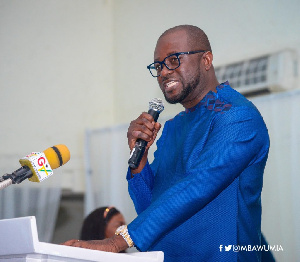The Supreme Court in January 2020, delivered judgment in a matter of Kwadwo Appiah vs Kwabena Anane.
The plaintiff is a victim of an accident in 2009 who sued the defendant for vicarious damages.
The case travelled from the High Court to the Supreme Court in eight years.
Mr Appiah initially asked for ¢400,000 but was finally granted ¢622,600.
The Supreme Court, delivering its judgment, said in part: “the time has come to be forward looking and award realistic and comparable compensation to comparable injuries to adequately compensate for the long-term deformity, mental torture and unimaginable losses suffered.”
Read the full story by below
Hello and welcome to the Bar. This week I want to share the judgment of a personal injury case resulting from a road accident. The victim is unmarried and has a child with no prospects according to the courts of fathering any child again.
The accident caused the victim to be paralyzed. Indeed, the medical report put his loss of genital functions as one hundred percent (100%). Loss of mobility as fifty (50%) and psychological injury as sixty percent (60%). The events, giving rise to this case, started on 28th April, 2009.
The case was fought in the High Court in Kumasi, was reviewed and ruled upon on appeal by the Court of Appeal and for a final and conclusive resolution, the case ended up in the Supreme Court. And was decided finally in January 2020. The Court was faced with the issue of “the appropriate level of compensation to adequately compensate the plaintiff in his personal injury claim?
And whether or not the court could award a higher amount than what was claimed by the plaintiff?
So what’s his story?
A timber merchant hired a truck to cart his timber logs from Diaso near Dunkwa to Mim in the then Brong Ahafo Region. On reaching a place called Kwabena Kumah, the vehicle was involved in an accident.
The plaintiff sustained serious injuries and was first sent to Goaso Government Hospital and later transferred to the Komfo Anokye Teaching Hospital in Kumasi where he received intensive care for about 5 months before being discharged to continue his treatment as an outpatient.
In 2012, he sued the owner of the truck for the sum of Gh¢400,000.00, special and general damages for the negligence of the driver resulting in the injuries suffered in the accident. It turned out the vehicle was not insured, did not have a road worthiness certificate and the driver was also not licensed by law to drive the vehicle at the material time.
What did the High Court say?
Well in the judgment delivered on 30th October 2015, the court found first that: the accident was not caused by negligent driving because the evidence of the police was that the vehicle developed a fault and fell down.
However, by permitting a vehicle to ply the road without valid documentation i.e., road worthiness certificate and insurance as well as authorising an unlicensed driver to drive the truck, the court held that the defendant should be held vicariously liable for the plaintiff’s claim.
And what is vicarious liability? That is where a person or entity is held for damages or harm caused by someone else. An example is when an employer is held liable for the action of one of his employees.
The judge then awarded the plaintiff general and special damages in the sum of Gh¢20,000.00.
Dissatisfied with this decision, the plaintiff appealed to the Court of Appeal. And in May 2018, the Court of Appeal reversed the award on the assessment of damages made by the High Court and awarded the plaintiff damages (those that could be quantified and those that couldn’t) and cost totaling Gh¢150,000.00
The defendant then appealed to the highest court, the Supreme Court requesting that they reverse the decision of the Court of Appeal and restore the award made by the High court.
Bear in mind, the Supreme Court is the last hope of the citizens.
Here are the Judges who sat on the case: Chief Justice Kwasi Anin Yeboah (PRESIDING), BAFFOE-BONNIE JSC, APPAU JSC, PWAMANG JSC, AMEGATCHER JSC
JUDGMENT – AMEGATCHER, JSC:-
In the words of Justice Amegatcher “the time has come to be forward looking and award realistic and comparable compensation to comparable injuries to adequately compensate for the long-term deformity, mental torture and unimaginable losses suffered.
This, we believe, will give affected persons hope that the State for that matter and the justice delivery system will not abandon them in their times of need. It will also serve as a deterrent to vehicle owners, drivers, professionals and workers into whose care precious lives of people are entrusted”.
In arriving at a decision, the Court considered the following factors:
- It is not in doubt that as a result of the accident, he became paralysed and this condition is likely to remain for the rest of his life. He went on the truck as a whole human being and after the accident came out on a stretcher and has been so ever since.
- The plaintiff has gone through considerable pain and suffering, cannot work as a timber merchant again and has no prospects of getting any paid job from any employer. It is not out of place to describe plaintiff as a total wreck and a citizen of this country with reduced capacity to enjoy the pleasures of life again.
- He is incapable of doing anything by himself, cannot get an erection again and is totally incontinent for the rest of his life. The plaintiff’s condition is the worst that can happen to any human being.
- Inflation, i.e., the purchasing power of money and the economic factors of the day.
- The Court also indicated that in June, 2012 when the action was instituted claiming GH¢400,000.00, the exchange rate of the United States Dollars to the Ghana Cedis was US$1=GH¢ 1.89.
In January 2020, the value was US$1=GH¢5.60. The value of the initial claim made by the plaintiff had therefore diminished over the eight years that the case had lingered on in the courts.
After considering all these factors, the Court awarded the following damages:

So in the end, the court varied the award by the Court of Appeal from GH¢150,000.00 to GH¢ 622,600.00 something that rarely happens.
Conclusion
It is a fact that productive lives are being rendered disabled due to serious injuries as a result of road crashes.
According to the Police MTTD, 94% of road crashes are caused through human error. Often the criminal process leaves victims disappointed with the paltry fines imposed on culprits as punishment.
Take for instance the case of the woman in her late twenties who was left paralyzed by an unlicensed driver driving a vehicle not road worthy.
He was only fined less than a thousand Ghana cedis. Yet his victim continues to live with the disability.
In the words of Justice Amegatcher delivering the judgment, he said “It could have been avoided but for the recklessness on our roads, coupled with impunity, indiscipline and lack of value for human life by drivers who ply the roads in this jurisdiction”.
So for all those in similar situations. You can seek remedies from the court…hopefully this brings you hope!
Source: my joy online.com















